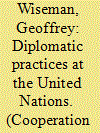| Srl | Item |
| 1 |
ID:
141722


|
|
|
|
|
| Summary/Abstract |
This article considers the importance of informal, practice-based change as opposed to formal change at the UN. I first evaluate UN reform, showing that diplomacy and institutional change within the UN system are better understood as having evolved less from major, formal reform of the UN Charter (‘the Charter’) than from minor changes in routine practices. I then examine what practice theory and diplomatic studies can learn from each other in terms of how each views the role of leading individuals, illustrating specific practice-based change in relation to the Secretary-General’s role. Next, I show how the appointment process for a new Secretary-General has evolved through informal practice, after which I advance an argument that UN diplomatic practices should be considered not only within the narrow context of a formal diplomatic corps of member state diplomats but also as part of an informal, wider diplomatic community of diplomats and non-state actors. Practice theory helps students of diplomacy think more abstractly and systematically about mundane diplomatic practices. Students of diplomacy can help guide practice theory toward empirical diplomatic activities that are often internalized and taken for granted. I conclude that a dialog between the two fields will promote a better understanding of diplomacy as undervalued practices.
|
|
|
|
|
|
|
|
|
|
|
|
|
|
|
|
| 2 |
ID:
154110


|
|
|
|
|
| Summary/Abstract |
This analysis shows how Japanese legations, first established in Europe during the 1870s, were not just symbolic gestures but played a key role in the Meiji government’s quest for international recognition. The concept of resident ambassador was unfamiliar beyond the European world, so the transition from sending visiting envoys to establishing permanent missions was a pivotal stage. Here a comparative framework gauges the importance of Japan’s new strategy within the context of similar experiments by states such as the Ottoman Empire, Persia, and subsequently China and Siam. The case of Sameshima Naonobu, Japan’s first resident minister in Europe, highlights the cultural barriers the Japanese faced. Assisted by Frederick Marshall, an Englishman at the Japanese Legation in Paris, Sameshima’s research on the mysteries encoded in this particular social universe offers some insight on the nature of the diplomatic corps in Europe.
|
|
|
|
|
|
|
|
|
|
|
|
|
|
|
|